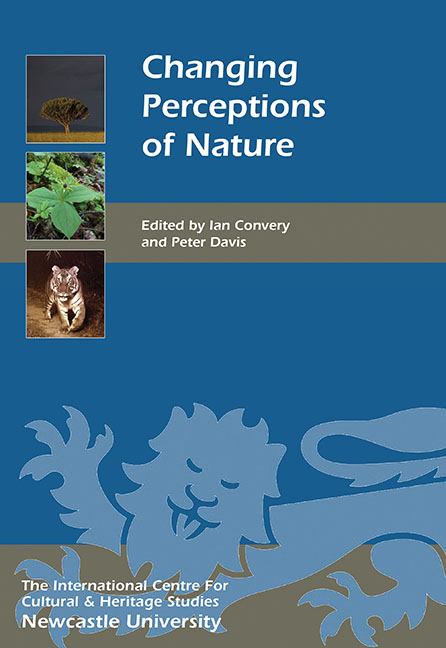Book contents
- Frontmatter
- Contents
- List of Illustrations
- Acknowledgments
- List of Abbreviations
- Foreword
- Introduction
- HISTORICAL PERSPECTIVES ON NATURE
- COLLECTING NATURE
- INTERPRETING NATURE AND LANDSCAPES
- 11 Changed Attitudes to Nature Reflected in the Transformation of Menageries to Zoos
- 12 Botanic Gardens: Changing Perceptions of Plants
- 13 Shifting Interpretations of the English Lake District
- 14 Facebook Nature: My Generation and Other Animals
- 15 Visual Narratives in Wildlife Film-making
- 16 A History of Half a Century of Wildlife Television and its Impact on Audiences
- 17 Landscape, Nature and the Contemporary Sublime in Illustrated Children's Literature
- CONSERVING NATURE
- PEOPLE–NATURE INTERACTIONS
- List of Contributors
- Index
- Miscellaneous Endmatter
14 - Facebook Nature: My Generation and Other Animals
from INTERPRETING NATURE AND LANDSCAPES
Published online by Cambridge University Press: 26 October 2017
- Frontmatter
- Contents
- List of Illustrations
- Acknowledgments
- List of Abbreviations
- Foreword
- Introduction
- HISTORICAL PERSPECTIVES ON NATURE
- COLLECTING NATURE
- INTERPRETING NATURE AND LANDSCAPES
- 11 Changed Attitudes to Nature Reflected in the Transformation of Menageries to Zoos
- 12 Botanic Gardens: Changing Perceptions of Plants
- 13 Shifting Interpretations of the English Lake District
- 14 Facebook Nature: My Generation and Other Animals
- 15 Visual Narratives in Wildlife Film-making
- 16 A History of Half a Century of Wildlife Television and its Impact on Audiences
- 17 Landscape, Nature and the Contemporary Sublime in Illustrated Children's Literature
- CONSERVING NATURE
- PEOPLE–NATURE INTERACTIONS
- List of Contributors
- Index
- Miscellaneous Endmatter
Summary
A NATURAL DISASTER WAITING TO HAPPEN?
In 2013, the Royal Society for the Protection of Birds and the University of Essex conducted a study to measure the connectivity of children to nature in the twenty-first century. Using a carefully constructed questionnaire, they drew a sobering conclusion: currently only 21% of eight to twelve-year-olds in England have a level of connection to nature that was considered to be a realistic and achievable target for all children (RSPB 2013).
At the same time, the mental and physical well-being of our children is dropping: one in ten children aged between five and sixteen has a mental health problem (Green et al 2005) and the physical fitness of children is declining by 9% per decade (Department of Health 2010), with 28% of children in the UK considered to be overweight or obese (Health and Social Care Information Centre 2013).
Experience of nature during childhood can have a significant impact upon an individual's attitude towards the environment, yet opportunities for children to participate, play and engage in green settings are diminishing. According to the latest estimates, fewer than 10% of children now play in natural areas, compared to 40% of today's adults who did so when they were children (Louv 2005; Bird 2007). This is an extraordinary and disconcerting figure, especially when I consider that I played in my local woods for many years as a child. This was not that long ago and yet we are now faced with an impending crisis: an entire generation of children fated to disconnect with nature.
In the 2012 National Trust report Natural Childhood, Stephen Moss discusses ‘Nature Deficit Disorder’ (NDD), a term coined by Louv (2005). He identifies two chief factors in the rise of NDD in less than a generation: a move towards a ‘screen-based lifestyle’ and ‘well-meaning, protective house arrest’ (Moss 2012). Since the 1970s, children's ‘radius of activity’ (the area near home where they can explore unsupervised) has diminished by 90%.
This will have knock-on effects, not only for the health of our children, but also for the wider environment, politics and businesses.
- Type
- Chapter
- Information
- Changing Perceptions of Nature , pp. 149 - 156Publisher: Boydell & BrewerPrint publication year: 2016



